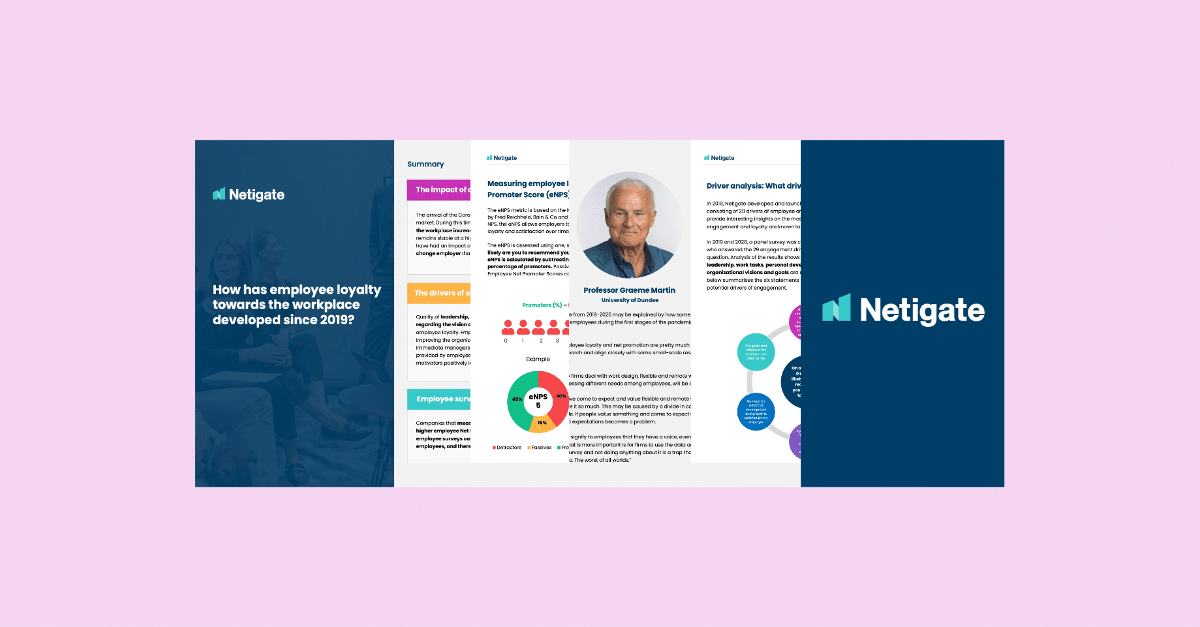At Netigate, we created our Purpose Project to investigate how employee loyalty towards the workplace has developed since 2019. To do this, we gathered data from 263 different companies that use the Netigate platform and have measured their employee Net Promoter Score during 2019, 2020, and 2021. The data behind the report consists of over 190,000 eNPS answers, which help us to understand employee loyalty development since the onset of the COVID-19 pandemic.
Download the full report here.
The importance of employee loyalty
Loyal employees are the cornerstone of a business. They are brand ambassadors who are engaged and satisfied at work. They will actively promote the business through positive word of mouth. This fuels growth both internally and externally, for employees and customers alike.
There’s also a link between employee loyalty and customer loyalty. Loyal employees are engaged and enthusiastic about their work and their company. This will positively impact other colleagues and customers.
In terms of other benefits to business, engaged and loyal employees are more productive, creative, and lead to reduced costs. High levels of loyalty and engagement can also result in improved financial performance for businesses.
70% of companies that measures their eNPS in both 2019 and 2020 saw a positive increase in their score
Among the companies involved in the research, we see that employee loyalty increased across the board from 2019 to 2020. Scores for 2021 have so far remained like those seen for 2020. In 2019, the average eNPS score was 9, with a fairly even spread of promoters, passives, and detractors. In 2020, the year of the onset of the COVID-19 pandemic, the average score increased to 17. Employees became more loyal towards their workplace.

What’s driving employee loyalty today?
While our key goal was to track eNPS development, we were also interested in understanding the factors that can drive employee engagement and loyalty. In 2019 and 2020, Netigate conducted a panel survey with over 3000 Swedish employees who answered an engagement driver question in combination with the eNPS question. Analysis of the results shows that business elements concerning leadership, work tasks, personal development and clarity regarding the organizational visions and goals are closely related to employee loyalty.
The impact of COVID-19 on employee loyalty development
The onset of the COVID-19 pandemic in March 2020 has led to significant changes in our personal and working lives. One of the most obvious consequences for employees has been the swift and extensive move to remote working.
Research conducted by Netigate in January 2021 showed that 32% of Swedish employees were still working from home full time, 47% from their ordinary workplace, and 21% doing a combination of both.
The companies that have succeeded in maintaining good communication during this period of remote working have a better chance of maintaining high engagement and loyalty among employees.

How employee surveys impact eNPS scores
We also investigated how employee surveys—or a lack thereof—impact enPS scores. Our research found that employees in Sweden who did not participate in any type of employee survey in 2019 and 2020 have lower eNPS scored compared to those at companies that used the Netigate tool to conduct at least one employee survey during the same period.
Of course, a significant part of conducting employee surveys is the handling of the feedback results and using the insights to make improvements. If a company fails to act on feedback, it can create frustration among employees, resulting in lower loyalty scores.

Ready to start investigating your own eNPS?
Read our ultimate guide to the employee Net Promoter Score or learn more about the Netigate eNPS software.








 Copyright © 2024 Netigate AB, Drottninggatan 25, 111 51, Stockholm, Sverige
Copyright © 2024 Netigate AB, Drottninggatan 25, 111 51, Stockholm, Sverige 